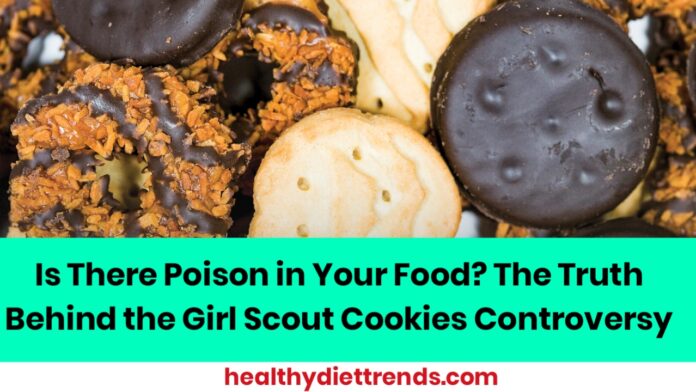Alarming headlines have raised serious concerns: Are beloved Girl Scout Cookies actually toxic? After reports claimed the presence of harmful chemicals and heavy metals in these cookies, a wave of public worry has followed. But how much of this is truly dangerous—and how much is just hype? Let’s break down the facts.
Where Did the Controversy Start?
The claims originated from a report published by Moms Across America, an advocacy group known for publishing independent research. According to their tests, each type of Girl Scout Cookie contained traces of glyphosate (a common herbicide) and five heavy metals—aluminum, arsenic, cadmium, lead, and mercury. Things escalated when popular podcaster Joe Rogan labeled the cookies “toxic” on his show. Shortly after, a class-action lawsuit was filed against the Girl Scouts and their licensed bakers.
How Reliable Is the Science?

A closer look at the report reveals significant limitations. First, the study was not peer-reviewed or published in a scientific journal. Only 25 cookies were tested, collected from just three U.S. states—a sample size far too small for meaningful conclusions. Moreover, the report compares the levels of toxins found in the cookies to standards for drinking water, even though the human body absorbs toxins from water more readily than from solid food. This kind of comparison can be misleading.
What Do Experts Say?
According to Dr. Katarzyna Kordas, associate professor of epidemiology and environmental health at the University at Buffalo, the findings don’t indicate an immediate threat. For example, the level of lead found in Peanut Butter Patties would require a child to eat about seven cookies a day to exceed the FDA’s recommended intake limit for lead. “Most children don’t eat that many cookies in a day,” she noted. Kordas emphasized that finding a substance in food does not automatically make it dangerous. “To go from ‘this is in the food’ to ‘this is harming people’ is a huge leap—we simply don’t have the data to say that,” she explained.
As for glyphosate, the EPA maintains that current exposure levels pose minimal risk to humans, and CDC data suggests that around 81% of Americans have traces of it in their bodies due to widespread use in agriculture. The amounts found in Girl Scout Cookies fall well within EPA safety limits.
What About Heavy Metals in Other Foods?
Here’s the reality: Heavy metals are everywhere. The FDA’s own found traces of them in store-bought cookies of all types—chocolate chip, sandwich, sugar, and more. That’s because metals like arsenic and lead occur naturally in soil, water, and air—which means they can end up in almost any plant-based food, organic or not. Even an organic carrot grown in clean soil can still contain small amounts of lead or cadmium. However, that doesn’t mean such foods are dangerous. Nutrients like fiber, iron, and calcium in food can reduce the body’s ability to absorb heavy metals.
Are Processed Foods the Problem?
The longer food takes to go from farm to fork, the greater the risk of contamination—from preservatives, packaging, and repeated processing. Many Girl Scout Cookies contain processed ingredients like wheat flour, cocoa, and vegetable oil, which themselves might have been processed multiple times. Each layer of processing adds a small amount of potential exposure. As Dr. Adam Simpson from the University of Southern California explains, “If you’re consuming food made up of other processed foods, you’re concentrating contaminants that build up over time.”
So, What’s the Solution?
The answer isn’t panic—it’s moderation. Dr. Kordas noted in her research that children who eat a balanced, varied diet do not have higher lead levels than others. Scary headlines rarely talk about how much of a food you’d need to eat to face any real health risk. As with most things in nutrition, the best approach is balance: enjoy treats like Girl Scout Cookies occasionally, not every day. As Dr. Simpson puts it, “You don’t have to say no—you can just say yes less often.”
Final Thoughts
While headlines about toxins in food can be scary, the science often paints a more nuanced picture. Before you swear off cookies forever, remember: eating responsibly and in moderation is usually all the protection you need.
Also Read : What Type of Psychotherapy Is Best for Anxiety?



